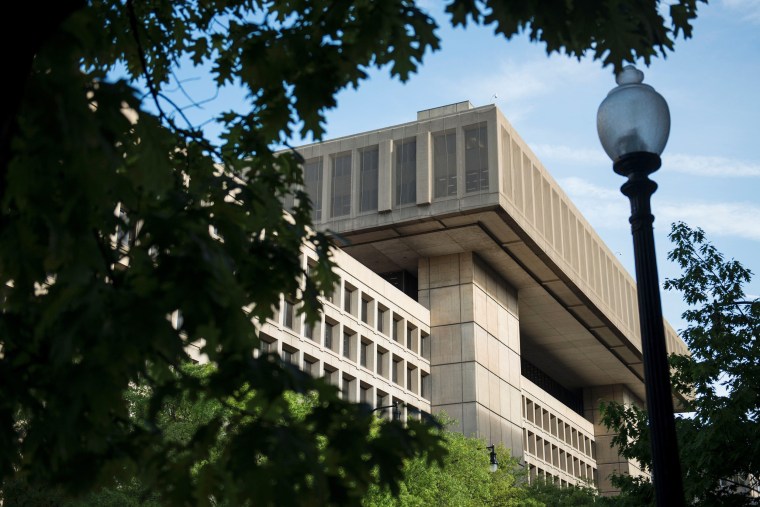There was an amazing moment on Capitol Hill yesterday afternoon, when Senate Majority Leader Mitch McConnell (R-Ky.) unveiled his party's $1 trillion economic aid package. Asked why the bill, which McConnell's office ostensibly helped write, includes $1.75 billion for the FBI's headquarters, the Republican leader replied, "I'm not sure that it is" in the proposal.
When an aide reminded McConnell that the money is, in fact, included in the package, the GOP senator said it was Donald Trump's White House that demanded the funding for the building. McConnell, apparently eager to pass the buck, added that it will be up to administration officials "to answer the question as to why they insisted on that."
A Washington Post report added:
Under intense White House pressure, Senate Republicans agreed Monday to allocate $1.75 billion in their coronavirus relief bill toward the construction of a new D.C. headquarters for the FBI. But top Senate Republicans immediately began distancing themselves from the provision after it was made public, saying they weren’t sure why the White House repeatedly insisted on putting it in the bill.
Remember, at issue is an economic aid package written specifically to address the coronavirus pandemic and its effects. Senate Appropriations Committee Chairman Richard Shelby (R-Ala.), part of the team that negotiated the Republican package, was asked yesterday what a new FBI building had to do with the public-health and economic crises.
The Alabama Republican paused before replying, “Good question.”
Not surprisingly, House Speaker Nancy Pelosi (D-Calif.) and Senate Minority Leader Chuck Schumer (D-N.Y.) were not pleased, with the latter asking yesterday, "What the heck is going on?”
It was a rhetorical question, though I think the answer is tough to avoid.
For those just joining us, let's revisit our earlier coverage of what I've long seen as one of the more under-appreciated scandals of the Trump presidency.
Trump’s keen interest in the FBI’s headquarters has been ongoing for quite a while. In fact, Axios reported exactly two years ago tomorrow on the president's "obsession" with the question about whether to leave the FBI where it is or relocate the bureau’s headquarters to a nearby suburb.
The president made it clear he was “dead opposed to plans to move it out of D.C.,” Axios added at the time.
Asked for an explanation, then-White House Press Secretary Sarah Huckabee Sanders told reporters in October 2018, “The president wanted to save the government money,” which is why he directly intervened in the project. The Wall Street Journal reported soon after that Sanders’ argument was the opposite of the truth: the administration knew that keeping the FBI headquarters in downtown D.C. "would cost more than a competing proposal to relocate to the suburbs."
As for why the president would take an interest in this in the first place, some geographic context is probably in order. For those unfamiliar with D.C., the Federal Bureau of Investigation is currently located along Pennsylvania Avenue, about four blocks east of the White House.
It’s also, incidentally, about a block from the Trump International Hotel, which the president still leases, operates, and profits from. If the current FBI headquarters were redeveloped in its existing space, it would guarantee that a competing hotel wouldn’t go in at that location.
All of which makes it interesting that the White House has not only been directly involved in the talks about plans for the building, but it's also pushing for a provision about the FBI headquarters' future in an unrelated economic package.
This issue came to the fore last week when GOP negotiators struggled to complete an aid package, in part because of Team Trump's insistence that the bill include a provision related to the FBI building. When a report asked the president directly if this issue was holding up his party's bill, Trump delivered a rather long answer, but he didn't deny the underlying allegation.
I thought it was at least possible that the attention last week would cause the White House to back off, but it didn't. Ignoring the controversy and the appearance of impropriety, Team Trump is pushing on, "insisting," to use McConnell's language, that a coronavirus bill include a provision that would indirectly help one of the president's businesses.
Given the reaction from leading Republican lawmakers, it seems likely the provision will be jettisoned during bicameral negotiations, and it's hard to believe the White House would issue a veto threat over this single issue.
That said, it's difficult to avoid the conclusion that Trump and his team are pursuing a corrupt goal in surprisingly brazen ways.

